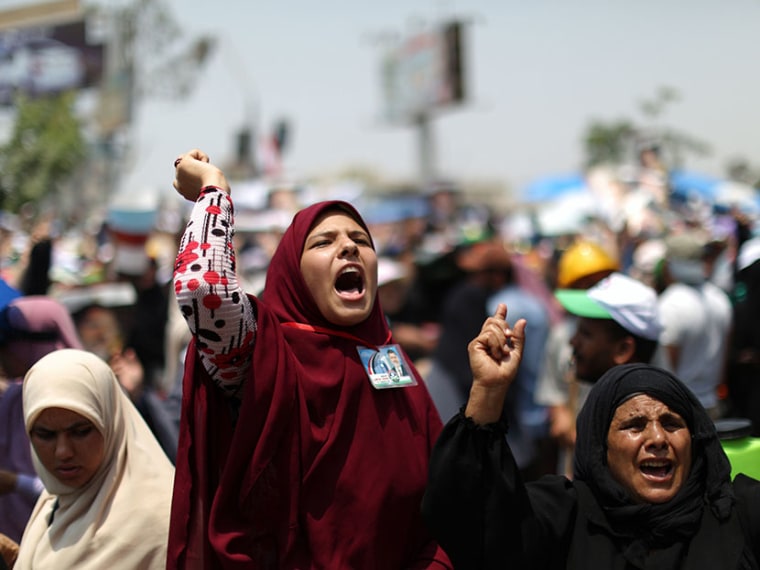Mounting tensions in Egypt over the fate of the country after President Mohammed Morsi’s ouster have exploded into mass protests attended by thousands, as the military called on Egyptians to take to the streets and bolster its mandate.
According to the Ministry of Health, six people have died in Alexandria, and 215 have been injured. Close to 200 people, mostly supporters of Morsi, have died in Egypt since the July 3 protests that resulted in the overthrow of Egypt’s first democratically elected president.
While Morsi has not yet been charged with any crimes, an Egyptian prosecutor ordered him to be held in state custody for 15 days on charges of conspiring with Hamas. Morsi has been held against his will since July 3.
Back in Washington Thursday, the Senate Foreign Relations Committee held a hearing on the crisis in Egypt. Senators including John McCain and Rand Paul focused on whether the mass uprising that removed him from power is classified as a “coup”--a distinction that would legally forbid the U.S. from contributing its $1.5 billion annual aid package, the vast majority of which goes to the military.
"It is not in our national interest to make such a determination," State Department spokeswoman Jen Psaki said Friday. “"The law does not require us to make a formal determination."
"Egypt serves as a stabilizing pillar of regional peace and security,” a senior administration official told NBC News, “and the United States has a national security interest in a stable and successful democratic transition in Egypt.”
The Egyptian army maintains that the uprising was not a military coup, rather, that the military responded to the will of the people, expressed through mass public protests.
“Those who believe what happened here was a revolution--a second revolution--are welcoming the news that the United States is not describing this as a coup,” said NBC Foreign Correspondent Ayman Mohyeldin, reporting from Cairo, on Andrea Mitchell Reports Friday. “They say that this is a good sign from the U.S. administration to right the wrongs of the past year and to continue its support to the military and to try to get Egypt back to a democratic government.”
“But…the Muslim Brotherhood and their supporters are saying this is a disgrace by the U.S., that they are not calling this a coup, and more importantly, it is adding fuel to their argument that there was an international conspiracy, some kind of conspiracy to try and topple the first democratically elected president of Egypt. And depending on which side of the table you ask here on the streets of Egypt at least, you're going to get that argument from both different sides.”
